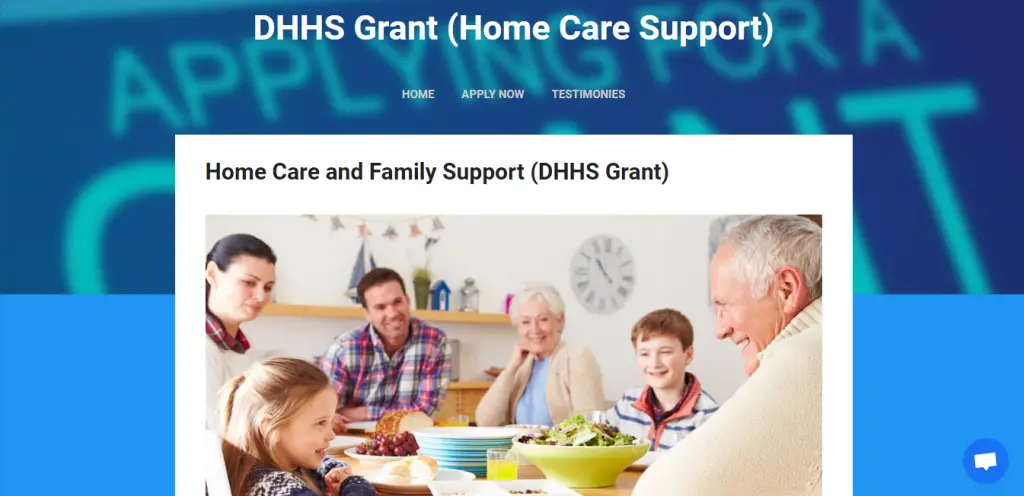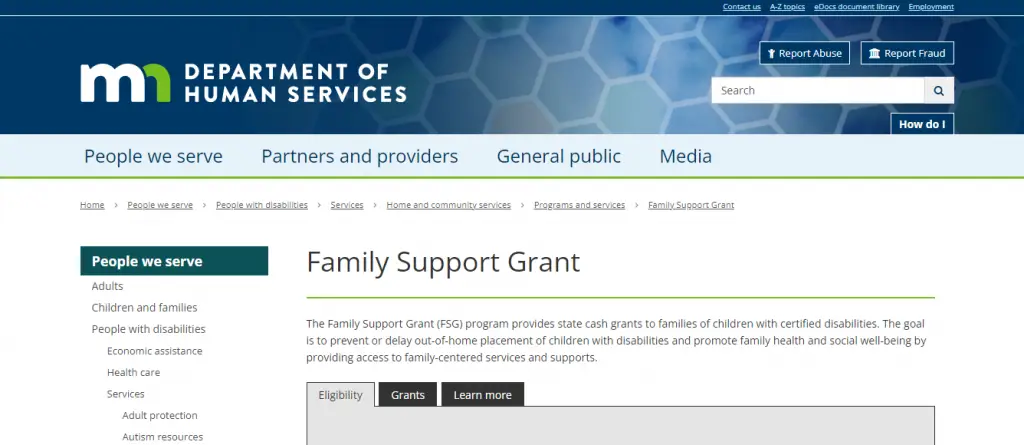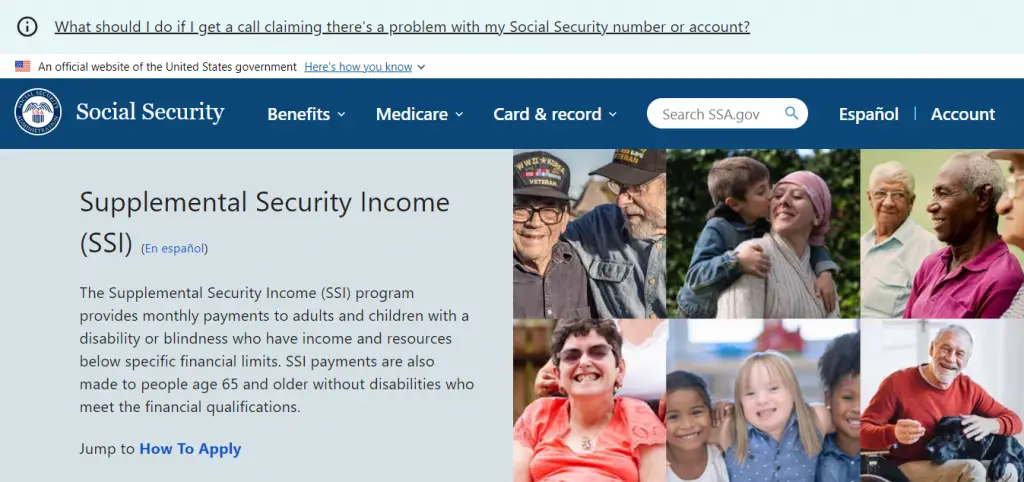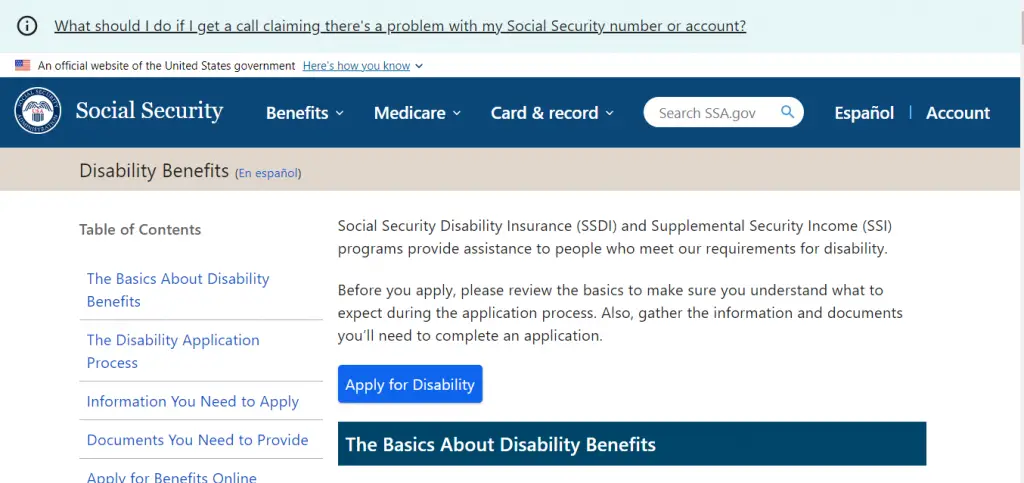As we navigate the challenges of modern life, one thing remains constant: the importance of family. Families provide a foundation of love, support, and care, but we understand that caring for loved ones can sometimes be financially burdensome. Home care and family support grant plays a very important role.
Whether it’s supporting elderly parents, individuals with disabilities, or young children, the responsibilities can be overwhelming, and finding the necessary resources to ensure their well-being can be a daunting task.
In recognition of these challenges, the Department of Health and Human Services (DHHS) has established the Family Support Grant program.
These programs help to promote family health and social well being along with financial assistance to people least able to help themselves.
The DHHS Family Support Grant is a lifeline for families, offering financial assistance and services to those in need, empowering them to provide the best possible care and support for their loved ones.
This article aims to shed light on the DHHS Family Support Grant and the various home care and family support grants available under its umbrella. Our primary goal is to equip you with essential information about these grants, how to access them, and how they can benefit your family and loved ones.
Table of Contents
Why Home Care and Family Support Grant matters?
The Home Care and Family Support Grant is of utmost importance to a common man for several reasons. It provides financial relief by offering assistance with medical expenses, therapies, and essential services.
Access to these services enhances the well-being of both the care recipient and the caregiver. The grant empowers caregivers through emotional support and resources, reducing stress and improving their ability to provide care effectively.
Additionally, improves the overall quality of life for care recipients, promotes independence, and reduces caregiver burnout through respite care services.
The grant fosters inclusivity and positively impacts communities, creating a more caring and compassionate society. In summary, this grant makes a significant difference in the lives of families, offering support, compassion, and hope.
6 Best home Care and Family Support Grants to avail
Home Care And Family Support Program (DHHS)

The Home Care and Family Support Program, established by the Department of Health and Human Services (DHHS), is a crucial initiative aimed at providing financial assistance and support services to families facing the challenges of caregiving.
The program addresses the needs of caregivers and care recipients alike, offering access to essential services such as home care assistance, counseling, therapies, and respite care.
The program plays a significant role in empowering families to navigate the demands of caregiving with dignity and compassion, making a positive impact on countless individuals and families nationwide.
Benefits of the Home Care and Family Support Program (DHHS):
- Aid for medical expenses, therapies, adaptive equipment, and caregiving services.
- Home care, counseling, therapy, respite care, and resources for well-being.
- Emotional support, counseling, and resources to reduce caregiver burnout.
- Specialized care and treatments for better overall quality of life.
- Access to adaptive technology and personal care assistance to maintain autonomy.
Eligibility Criteria for the Home Care and Family Support Program:
- Focus on families caring for elderly relatives, individuals with disabilities, or children with special needs.
- Based on financial criteria to support those with limited means.
- Applicants must be legal residents of the program’s country.
- Eligibility varies based on care recipient’s needs and required services.
- Families must apply with relevant documentation.
- Some cases require an evaluation of care recipient’s needs and family circumstances.
Family Support Grant (FSG)

The Family Support Grant (FSG) offers financial assistance and resources to families caring for individuals with disabilities. It aims to ease the financial burden of caregiving and improve the quality of life for both the care recipient and the caregiver.
Eligibility and benefits vary based on the specific region or state where the FSG operates.
Benefits of a Family Support Grant:
- Regular cash payments for housing, food, clothing, and utilities.
- Access to medical, dental, and vision care.
- Resources for skill-building and improving long-term financial prospects.
- Support for childcare expenses to facilitate work or education.
Eligibility criteria for a Family Support Grant:
- Specific income requirements must be met.
- Family size and dependents considered.
- Available to citizens or legal residents of the country or state.
- Active job-seeking or participation in job training may be required.
- Restrictions on total family assets.
- Grants for families facing hardships like disability, domestic violence, or homelessness.
Supplemental Security Income (SSI)

Supplemental Security Income (SSI) is a federal government program that provides financial support to individuals with low income and limited resources, especially those who are elderly, blind, or disabled. The program is administered by the Social Security Administration (SSA).
Benefits of Supplemental Security Income (SSI):
- Monthly payments for essential living expenses.
- Access to essential medical services.
- Eligibility for SNAP (food stamps) to purchase food.
- Additional financial support in some states, increasing the monthly benefit.
Eligibility criteria for Supplemental Security Income (SSI):
- 65 or older, blind, or qualifying disability required.
- Must have income below certain limits, including wages and benefits.
- Total countable assets must be below a threshold, with some exclusions.
- Must be a U.S. citizen or meet specific residency requirements.
- May need to apply for other eligible benefits as part of the application process.
Temporary Assistance For Needy Families (TANF) Program
The Temporary Assistance for Needy Families (TANF) program is a federal assistance program in the United States aimed at providing temporary financial support to low-income families with dependent children.
The program’s primary focus is to promote self-sufficiency by offering assistance, work opportunities, and support services to help families overcome economic challenges.
Benefits of the Temporary Assistance for Needy Families (TANF) Program:
- TANF provides monthly cash benefits to eligible families to cover basic needs like housing, food, clothing, and utilities.
- The program emphasizes employment and self-sufficiency, encouraging recipients to participate in work-related activities or job training programs.
- TANF offers various support services such as childcare assistance, transportation, and job placement services to help families find and maintain employment.
- TANF benefits are typically time-limited, meaning families can only receive aid for a specified period to encourage independence.
- The program aims to promote the well-being of children in low-income families by providing access to essential resources and services.
Eligibility criteria for the Temporary Assistance for Needy Families (TANF) Program:
- Families must have limited income and financial resources to qualify for TANF assistance. The specific income limits vary by state.
- Families applying for TANF must have at least one dependent child under the age of 18 (or 19 if the child is a full-time student).
- Applicants must be U.S. citizens or have certain qualified non-citizen immigration statuses.
- Applicants must be residents of the state in which they are applying for TANF benefits.
- Recipients are generally required to participate in work activities or work-related programs, unless exempted due to specific circumstances (e.g., disability, caring for a young child).
- TANF benefits are often subject to time limits, meaning families can only receive assistance for a maximum number of months within a specified period.
Subsidized Rental Housing
Subsidized Rental Housing is a housing assistance program that provides financial aid to low-income individuals and families, making housing more affordable and accessible.
The federal government offers subsidized rental housing facilities like these to help with to help with their rents. These programs are typically administered by Government government agencies reduced rents for eligible participants who have privately owned housing as well.
Interested applicants may need to contact their local public housing agency to get on the listing or can directly apply at an individual property in case of privately owned housing.
Subsidized Rental Housing facilities are as follows:
- Reduces rent burden, making housing more affordable.
- Helps prevent eviction or homelessness.
- Ensures safe and well-maintained housing.
- Offers additional support for tenants’ well-being.
Eligibility criteria for Subsidized Rental Housing:
- Must meet program’s income guidelines, with priority for lower-income households.
- Applicants must be U.S. citizens or eligible immigrants.
- Applicants screened for criminal history and rental background.
- Household size and dependents considered.
- Programs may have waiting lists due to high demand.
- Additional factors like disability or veteran status may be considered.
Social Security Disability Insurance (SSDI)

Social Security Disability Insurance (SSDI) is a federal program in the United States that provides financial assistance to individuals with disabilities who are unable to work due to their medical condition. The program is administered by the Social Security Administration (SSA).
Benefits of Social Security Disability Insurance (SSDI):
- Regular payments to cover living expenses.
- Access to essential healthcare services after a waiting period.
- Programs to support recipients returning to work or vocational rehabilitation.
- Eligible family members receive auxiliary benefits based on the recipient’s work record.
Eligibility criteria for Social Security Disability Insurance (SSDI):
- Earned enough credits through Social Security taxes based on work history and earnings.
- Disability must prevent substantial gainful activity (SGA).
- Expected to last at least 12 months or result in death.
- Not eligible for similar cash assistance programs.
- Generally under full retirement age.
- Supporting evidence of disability’s impact on work ability.
- Benefits start after a five-month waiting period from disability onset.
Conclusion
The DHHS Family Support Grant program stands as a beacon of hope and compassion for families across the nation.
As we have explored the six essential home care and family support grants offered by the program, it becomes evident that this initiative plays a pivotal role in enhancing the lives of countless individuals and caregivers.
The program’s benefits are manifold, providing families with financial relief, access to vital services, and emotional support, fostering a more inclusive and caring society.
Whether it’s assisting elderly relatives, supporting individuals with disabilities, or nurturing the growth of our children, the Federal Family Support Grant empowers families to provide the love and care their cherished ones truly deserve.
